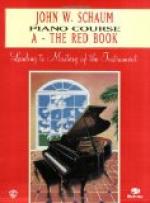“My father wrote out for me a great many technical exercises; to be exact, there were 580 of them! Some consisted of difficult passages from the great composers—perhaps originally written for one hand—which he would arrange for two hands, so that each hand had the same amount of work to do. Thus both my hands had equal training, and I find no difference between them. These 580 exercises took just three days to go through. Everything must be played in all keys, and with every possible variety of touch—legato, staccato, half-staccato, and so on; also, with all kinds of shading.”
(Think of such a drill in pure technic, O ye teachers and students, who give little or no time to such matters outside of etudes and pieces!)
“Part of my training consisted in being shown how to criticize myself. I learned to listen, to be critical, to judge my own work; for if it was not up to the mark I must see what was the matter and correct it myself. The earlier this can be learned the better. I attribute much of my subsequent success to this ability. I still carry out this plan, for there on the piano you will find all the notes for my coming recitals, which I work over and take with me everywhere. This method of study I always try to instill into my pupils. I tell them any one can make a lot of noise on the piano, but I want them, to make the piano speak! I can do only a certain amount for them; the rest they must do for themselves.
VALUE OF TRANSPOSING
“Another item my zealous teacher insisted upon was transposing. I absorbed this idea almost unconsciously, and hardly know when I learned to transpose, so natural did it seem to me. My father was a tactful teacher; he never commanded, but would merely say, ’You can play this in the key of C, but I doubt if you can play it in the key of D.’ This doubt was the spur to fire my ambition and pride: I would show him I could play it in the key of D, or in any other key; and I did!
“With all the technic exercises, I had many etudes also; a great deal of Czerny. Each etude must also be transposed, for it would never do to play an etude twice in the same key for my father. So I may say that whatever I could perform at all, I was able to play in any key.
“For one year I did nothing but technic, and then I had my first piece, which was nothing less than the Capriccio of Mendelssohn, Op. 22. So you see I had been well grounded; indeed I have been grateful all my life for the thorough foundation which was laid for me. In these days we hear of so many ‘short cuts,’ so many new methods, mechanical and otherwise, of studying the piano; but I fail to see that they arrive at the goal any quicker, or make any more thorough musicians than those who come by the royal road of intelligent, well-directed hard work.”
Asked how she obtained great power with the least expenditure of physical strength, Mme. Carreno continued:




